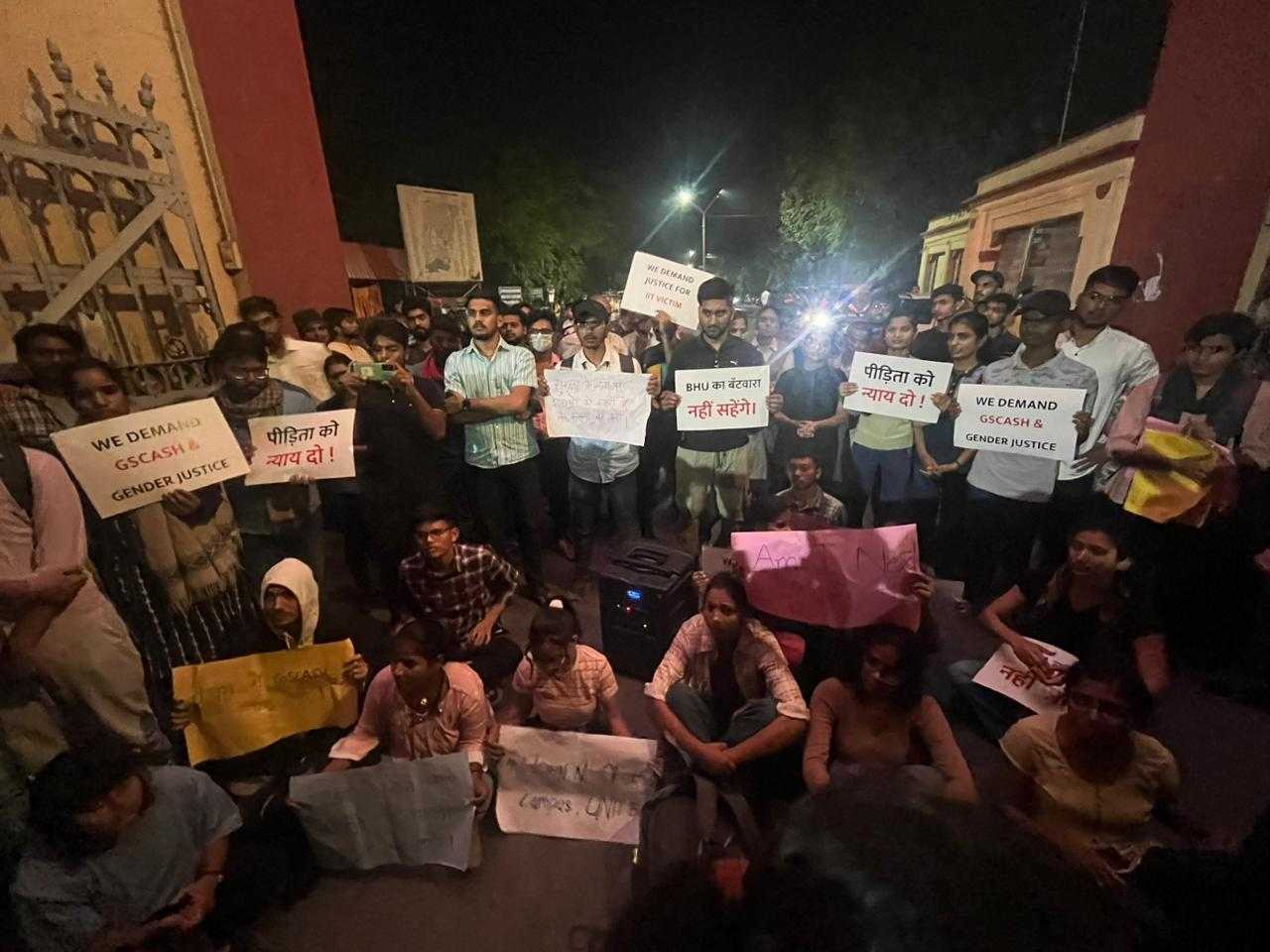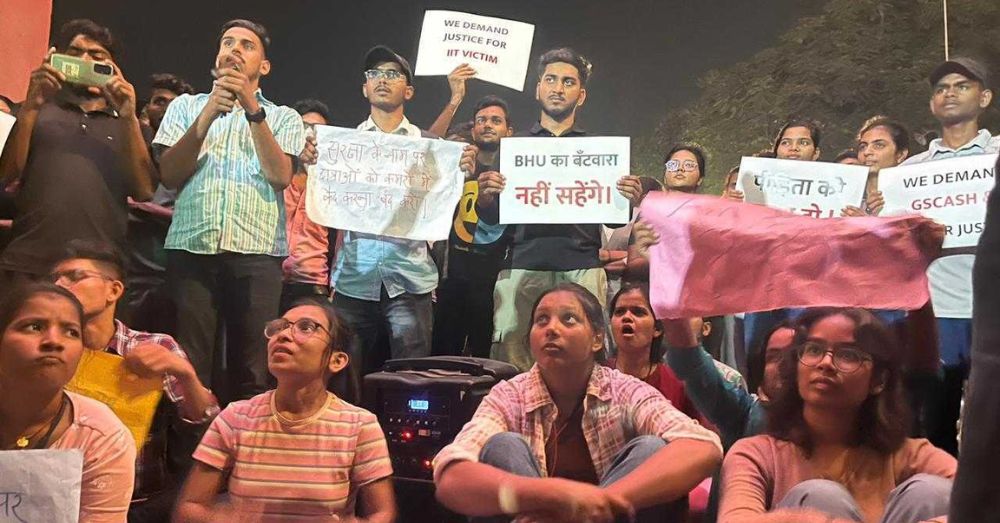Co-Authored By: Chetna Trivedi, (PhD Candidate, JNU)
Trigger Warning: Mentions Sexual Harassment, Gang Rape And Violence
In a shocking incident on 1st November Wednesday, around 1 am at night, a female student who was walking inside the campus near her hostel, was chased and groped by three men on a bullet. They first made comments on her, abused her then raped her to violate her bodily integrity.
As she resisted they made a video of her and threatened to share it on social media. The student said in her complaint that the men separated her from her friend and forcibly took her to a corner.
They stripped her, made her video and clicked photos, the student said in her complaint. The accused let her go after 15 minutes and took her phone number, the complaint stated in the report. It has been more than 20 days and the perpetrators have not been identified yet.
The plaintive incident of gang rape in an educational institution raises serious questions on the various standards and notion of security.

Students protesting at BHU
After this incident, thousands of students gathered from the next morning itself. The students have also raised concerns over the lack of security for women inside the campus. The students have also alleged that the administration has been turning a blind eye to such incidents in the past as well.
Six years back in September 2017, the BHU campus had witnessed a similar incident, and many such incidents have taken place since then in the campus. But the campus administration, despite having a heavy budget for security concerns, is unable to provide basic security to women inside the campus.
The students were demanding that the administration must take the matter with utmost urgency and at least ensure a speedy enquiry. Some of the students from IIT BHU were also demanding a separate boundary for itself, along with a proper functioning of the CCTV cameras.
They were also demanding deployment of heavy police force on the campus. The issues with this particular demand are several but the crucial one is to understand that increasing security and boundaries in one part of the campus may not guarantee security to the whole campus.
How can boundary walls ensure the safety of students when such large teams of proctorial guards, platoons of Provincial Armed Constabulary (PAC) and a police post are already on the campus, yet such incidents are happening openly on the campus? Such demands only curb the freedom of students.
The idea of university is about liberal atmosphere, critical thinking and free lifestyles where there is no space for captivity and separation. Walls never ensure anyone’s safety. The nature of the demands must be holistic in order to ensure that freedom of mobility is not hampered but at the same time such incidents must come to an end. The fundamental issue here is all about justice and accountability.
First of all, the survivor should get justice and the culprits should be identified and punished immediately. Also, accountability for campus security should be fixed on the administration. There should be sufficient security measures for women inside the campus, without imposing further restrictions on them, since this is the usual approach the administration often resorts to.
Whenever such incidents transpire in BHU, the administration attempts to dilute the issue by making the excuse that BHU is an open campus. They argue that due to the presence of a hospital and temples in the campus, it is not possible to provide adequate security.
Till date, the perpetrators of the sexual violence incident that took place in 2017 have neither been identified nor arrested. Due to the insensitive conduct of the administration, not only are the victims being deprived of justice but the assaulters are also being encouraged to carry out such incidents.
We believe that the problem is not of open campus but of misconceptions and faulty mechanisms regarding women’s safety. Such incidents are also occurring in those campuses where entry is only allowed after checking the student identity cards at the entry gate.
There have been movements in educational institutions across the country for implementation of Vishakha guidelines and formation of Gender Sensitization Committee Against Sexual Harassment (GSCASH), but the demand has been constantly denied by the university administrations.
On 3 November, the female students of BHU appealed for ‘JUSTICE MARCH’ against the gruesome incident that took place on the campus. After this march, the students sat at the main gate of BHU. Their main demands were that the victim should get justice, action should be taken against the culprits, GSCASH should be formed and all discriminatory rules of the campus should be abolished.
No workshops or discussions on gender sensitization are conducted among security guards, non-teaching staff, faculty members and students in the campus. In place of the elected body of GSCASH, Internal Complaint Committee (ICC) has been formed which acts as puppet of the administration.
In fact incidents of eve teasing, sexual harassment and misogynist comments on the streets, that one women witness on daily basis, are ignored until the students are agitated and massive demonstrations take place.
Apart from this, the administration has no mechanism to prevent such incidents and identify the criminals to take action. Despite a huge security budget and a contingent of proctorial guards, the administration has failed to provide basic security on the campus.
It is evident that the rate of such crimes is high in restricted and narrow environments whereas in open and liberal societies where everything is discussed openly, the rate of such crimes is found to be low.
Gender sensitization committee against sexual harassment (GSCASH) is a democratic body which not only works for redressal of complaints in cases like sexual harassment in institutions and workplaces but also works for spreading gender sensitization and awareness there.
In 1997, Vishakha Guidelines were issued by the Supreme Court of India with the aim of preventing cases of sexual harassment and establishing the values of gender equality and sensitivity in institutions and the society at large.
BHU students’ demands from the administration after the incident
It was later replaced by the ‘Sexual Harassment of Women at Workplace (Prevention, Prohibition and Redressal) Act 2013’. Under this law, every institution will have to constitute a body like GSCASH in which at least 50 percent representation of women is mandatory.
Representation of teaching staff, non-teaching staff, civil society and students will have to be ensured in the GSCASH of the university. Decades have passed since this law was enacted but no such committee has been formed in BHU.
After a sexual harassment incident in BHU in 2013, the administration formed a Women’s Grievance Cell, which is just a puppet of the administration. There is no elected representative of students and non-teaching staff in the committee.
This committee is full of members with anti-women patriarchal mindset who not only insensitively ignore cases of sexual harassment but in many cases even they go to the extent of character assassination of the victim.
GSCASH is implemented in many universities of the country which is effectively addressing the issue of sexual harassment and sensitivity.
A large crowd of students protesting in the campus after the incident.
The frequency of such cases in campuses are a result of many factors but the impunity given to the perpetrators is one of the most crucial factors. The JNU campus, in the recent past has also witnessed an increase in such crimes.
There is an urgent need on the part of BHU and other university campuses to take cognisance of such matters, without adapting to the most obvious and detrimental approach of curbing the freedom of mobility of the students.
Roshan Pandey , PhD Candidate, BHU
Chetna Trivedi, PhD Candidate, JNU
